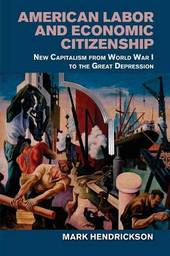
|
American Labor and Economic Citizenship: New Capitalism from World War I to the Great Depression
Paperback / softback
Main Details
| Title |
American Labor and Economic Citizenship: New Capitalism from World War I to the Great Depression
|
| Authors and Contributors |
By (author) Mark Hendrickson
|
| Physical Properties |
| Format:Paperback / softback | | Pages:338 | | Dimensions(mm): Height 228,Width 151 |
|
| Category/Genre | Labour economics
Political economy
Economic history |
|---|
| ISBN/Barcode |
9781107559677
|
| Classifications | Dewey:330.973091 |
|---|
| Audience | | Professional & Vocational | |
|---|
| Illustrations |
3 Halftones, unspecified
|
|
Publishing Details |
| Publisher |
Cambridge University Press
|
| Imprint |
Cambridge University Press
|
| Publication Date |
18 June 2015 |
| Publication Country |
United Kingdom
|
Description
Once viewed as a distinct era characterized by intense bigotry, nostalgia for simpler times and a revulsion against active government, the 1920s have been rediscovered by historians in recent decades as a time when Herbert Hoover and his allies worked to significantly reform economic policy. Mark Hendrickson both augments and amends this view by studying the origins and development of New Era policy expertise and knowledge. Policy-oriented social scientists in government, trade union, academic and nonprofit agencies showed how methods for achieving stable economic growth through increased productivity could both defang the dreaded business cycle and defuse the pattern of hostile class relations that Gilded Age depressions had helped to set as an American system of industrial relations.
Author Biography
Mark Hendrickson is Assistant Professor of History at the University of California, San Diego.
Reviews'Mark Hendrickson has crafted an important narrative that explains how early twentieth-century American business leaders, social scientists, and political activists worked to regulate, stabilize, and strengthen a newly configured national economy. He demonstrates how their efforts were ironically paralleled by the emerging resistance of marginalized and underrepresented groups (women, African Americans, and Mexican Americans) to the worst excesses of an economic system that, while possessed of many virtues, also subsisted on inequality and injustice.' Michael A. Bernstein, Tulane University, Louisiana 'Mark Hendrickson breathes new life into the history of the 1920s, showing that economic life in the Jazz Age was far more contested than previously imagined. As economists, politicians, union leaders, and advocates for African-American and Mexican-American workers grappled with an emerging consumer society, debates over economic knowledge became struggles over the terms of American citizenship itself. Brilliantly combining political economy and social history, American Labor and Economic Citizenship is a model of the most exciting new scholarship on the political history of capitalism in American life.' Christopher Capozzola, Massachusetts Institute of Technology 'Mark Hendrickson sharpens our understanding of the effort to rethink the place of workers in an increasingly consumer-oriented economy in the 1920s. As American Labor and Economic Citizenship shows, experts from an array of institutions championed research that challenged Hoover-era assumptions about the ability of growth to ease labor conflict, particularly for a labor force increasingly divided by race and gender. Ambitious and sophisticated, Hendrickson's work will revise our thinking on questions ranging from the influence of expertise in policy making to the continuing struggle for full economic citizenship.' Andrew Morris, Union College, New York 'A significant contribution to our understanding of how the 1920s fit into the construction of the liberal social contract in the United States. An enduring achievement.' Kathryn Kish Sklar, State University of New York, Binghamton 'Hendrickson brings the players and their organizations together in a comprehensive, well-organized, and readable account. He also shows that, despite their common acceptance of the power of inquiry and analysis, 'new era' experts came to sharply different conclusions regarding the ability of capital and markets to balance production and consumption and to distribute appropriately the rewards from productivity gains.' The Journal of American History 'Hendrickson's book provides valuable insight into the modestly ameliorative consequences of empirical inquiry in government, academia, and nonprofit foundations that aspired to impartiality.' Alexander J. Field, The American Historical Review
|